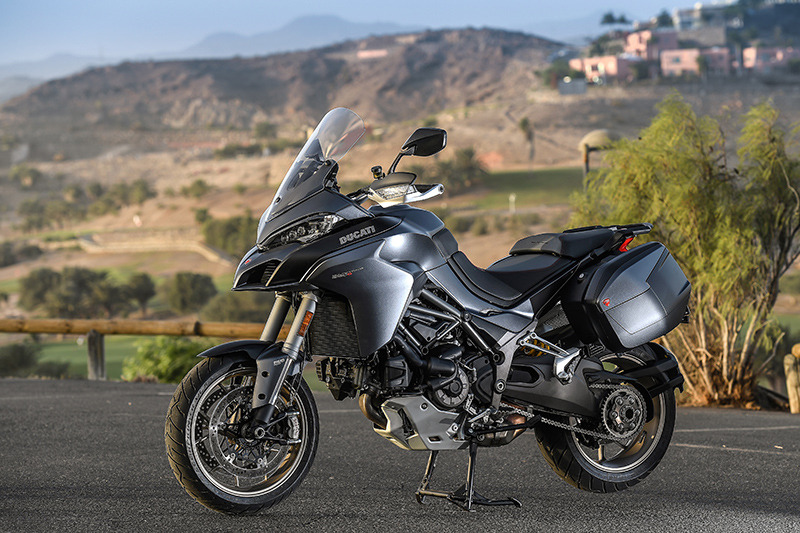2018 Ducati Multistrada 1260 S Touring

First Ride Review
Take some of the twistiest roads in the world, wrap them around a 6,400-foot-high volcano on an exotic isle off the coast of northwestern Africa and you have Gran Canaria, the third largest island in the Spanish Canary Islands archipelago, which—lucky for us—is hugely popular with Ducati for introducing new models. The latest is the 2018 Multistrada 1260, which now derives its Testastretta 11-degree DVT L-twin from the muscular X-Diavel cruiser. Adapting the engine to the Multi required a new intake and exhaust and relocating the X-Diavel’s hidden water pump to the side on the Multi, since it has a different frame and engine beauty isn’t as crucial. But it was worth it to get the 1,262cc engine’s longer stroke and 64cc bump in displacement, which give the largest Multistrada an 18-percent increase in torque at 5,500 rpm, smack in the midrange where most of the business of sport touring gets done.
Although Ducati claimed higher peak numbers for the Multistrada 1200’s engine with variable valve timing (DVT) when it was first introduced for 2015, for the Multistrada 1260 it says max horsepower is up 6, to 158 at 9,500 rpm, and claimed torque output maxes out at 95.1 lb-ft at 7,500 rpm. Up or down those are pretty stunning numbers for a base bike that weighs just 518 pounds (claimed) fully gassed and ready to ride. Most importantly, Ducati says that 85-percent of max torque is available from 3,500 rpm to well past 9,000. So, by going with the larger mill, Ducati has made its premier sport-touring adventure bike even easier and more fun to ride, whether you use it for sport touring or carving up the most insane winding roads you can find, a la Gran Canaria.
Regardless of the conditions, the liter-class Multistrada’s numerous electronic rider aids are always a comfort to have working for you, and now on the 1260 they’re easier to set up. In addition to a brighter, higher resolution TFT display on the S model (the basic Multi 1260 gets an LCD unit), the menu system has been refined so that it’s far more intuitive to switch among the four riding modes, Sport, Touring, Urban and Enduro, or customize the settings for the cornering ABS, traction control, wheelie control, vehicle (hill) hold control and Dynamic Skyhook Suspension EVO on the S that are otherwise preset by the chosen riding mode. The handlebar switchgear is similarly improved for more ease of use. And in this electronic age, Ducati is now the second after Zero to create a smartphone app that pairs with the bike via Bluetooth and offers extended data logging, shared riding experiences via social media, service and maintenance info and the ability to set all of the motorcycle’s electronic parameters in real time or remotely. Imagine lying in bed on a ride-day morning and setting the bike’s riding mode, custom ABS, traction control levels and such on your phone before you get up, and then when you reconnect with the bike all of the changes are made automatically. Seems like just yesterday I was filing and cleaning breaker points….
Now that the Enduro version of the larger Multistrada range has taken some of the pressure off the standard bike to spit gravel like its competitors, Ducati is free to emphasize the two-up touring and sport sides of the Multistrada 1260. To that end the new bike has a 1.9-inch longer single-sided swingarm, and 1-degree more rake and 0.2-inch more trail in the revised trellis frame, increasing the wheelbase 2.2 inches to 62.4 for more stability at high speed and/or when carrying a passenger and full luggage. Fairing side panels have been reshaped to improve airflow around the side cases and top trunk, and a new rear grab handle from the Enduro model allows the fitment of the factory Touratech aluminum side cases as well as the plastic panniers.
In the U.S. four models will be offered ranging in price from $18,695 to $24,995: Multistrada 1260, 1260 Touring, 1260 S, 1260 S Touring like our test bike and 1260 Pikes Peak, which has fully adjustable Öhlins suspension, performance exhaust and a box-full of carbon fiber goodies. Touring versions get improved heated grips (that get genuinely hot on high), a pair of highly functional side cases and an easy-to-use centerstand. Those items are also available as the Touring Pack on other models along with Sport Pack, Urban Pack and Enduro Pack accessory combo platters.
Upgrades for 2018 common to all include ride-by-wire throttle control, new Y-spoke wheels that are 12 ounces lighter, cleaner side skirts for the adjustable seat, a more accurate cruise control, LED rear turn signals and tire pressure monitoring as an option. S models and the Pikes Peak also receive a new up/down quickshifter as standard, keyless ignition and retain that cool multiple LED headlight with cornering lights.
Although we only put about 150 miles on 1260 S Touring models on Gran Canaria, most of it was spent in 2nd and 3rd gear on furiously winding roads, turning those miles into a nearly daylong ride. While the initial 1200 DVT model felt much smoother than its predecessor down low without any loss of that heady 150-plus horsepower on top, making it much nicer to ride than the typical Ducati engine that bucks and snorts down low, this new 1260 is also punchier throughout the powerband. Full acceleration in Sport mode is like being shot out of a cannon, yet the bike can also be ridden smoothly and sedately in Touring mode at 4,000-6,000 rpm with full power on tap at any time. All of the riding modes make corresponding adjustments to the electronic rider aids and DSS Evo on the S model, and though I tried making some custom adjustments to some I found the default settings just fine. Both 100-horsepower Urban and Enduro modes really soften the bike up both in terms of power and suspension performance, and after using them it’s truly enlightening to re-engage Touring or Sport with their snappier throttle response and firmer suspension settings.
Gran Canaria’s roads are like a bowl of spaghetti with a mountain in the center and were probably the ultimate test of the Multi’s handling. The bike comported itself quite well, too. I didn’t notice any sluggishness to the steering or turn-in as a result of the longer wheelbase and new front-end geometry—if anything the bike felt as if it turned in too quickly on occasion—and overall it went where I pointed it fluidly and willingly, even in the nastiest of hairpins, and the stock Pirelli Scorpion Trail II tires are a perfect match for the bike and stick like glue on dry roads.
The 1260 S models that we tested come with semi-active Ducati Skyhook Suspension Evo, so the only aspect of the electronic suspension I needed to set was the preload level, choosing from solo rider, solo rider with luggage, two-up and two-up with luggage—the chosen riding mode calibrates the damping dynamically as you ride. I started out in Touring mode, which soaked up the bumps on the fast, snaky ride up the mountain but felt a bit splashy in the corners. Then I switched to Sport mode, which firmed up the suspension front and rear just the right amount for a precise feel all around without beating me up. In my opinion, though I haven’t tried the manual fully-adjustable Sachs suspension on the base 1260, the DSS Evo is worth the 1260 S price of admission. It really is amazing to feel the dynamic changes to the damping as they’re taking place over bumps and in corners, especially since the bike literally floats along the rest of the time.
Thanks to a sophisticated braking system, the 1260 S stops just as quickly as it accelerates. Upgraded 330mm front brake discs with Brembo M50 Evo 4-piston radial calipers, a radial lever pump and a single 265mm disc and 2-piston caliper in back are integrated with cornering ABS, four pressure detectors that proportion braking force and rear and rear-wheel lift detection, all of which adjust to one of three levels of intervention automatically based on the riding mode or by the rider. ABS can also be switched off in back or entirely for dirt riding. The front brakes are strong enough to bug your eyes out without much effort at the lever and have really good feel, and the back felt quite sufficient on my test bike as well.
The real beauty of the Multistradas is that their precise handling, fire-breathing engine performance and stellar suspension and brakes are combined with all-day comfort from a mostly upright, relaxed seating position that still works well in attack mode. I was supremely comfortable all day except for a bit of vibration that creeps into the seat-tank junction area at mid to high engine rpm. Some riders may find the tallish seat height a showstopper, though I didn’t have any trouble living with it in the higher position, and I have a 29-inch inseam. Wind protection from the one-hand adjustable screen is effective if a bit noisy, and all of the bike’s convenience features like cruise control, the keyless ignition, adjustable brake and clutch levers, the TFT display and more work exceptionally well.
With more than 150 horsepower at the crank and a warehouse full of torque, Ducati’s Multistrada 1200 has been a giant among sport-touring adventure machines since it was introduced for 2010. The latest 1260 version encapsulates a high degree of refinement, innovative engineering and an even better understanding of just who the Multistrada customer is to create a consummate sport-touring adventure bike that is equally at home in sport, touring or commuter roles…often at a somewhat elevated pace!
